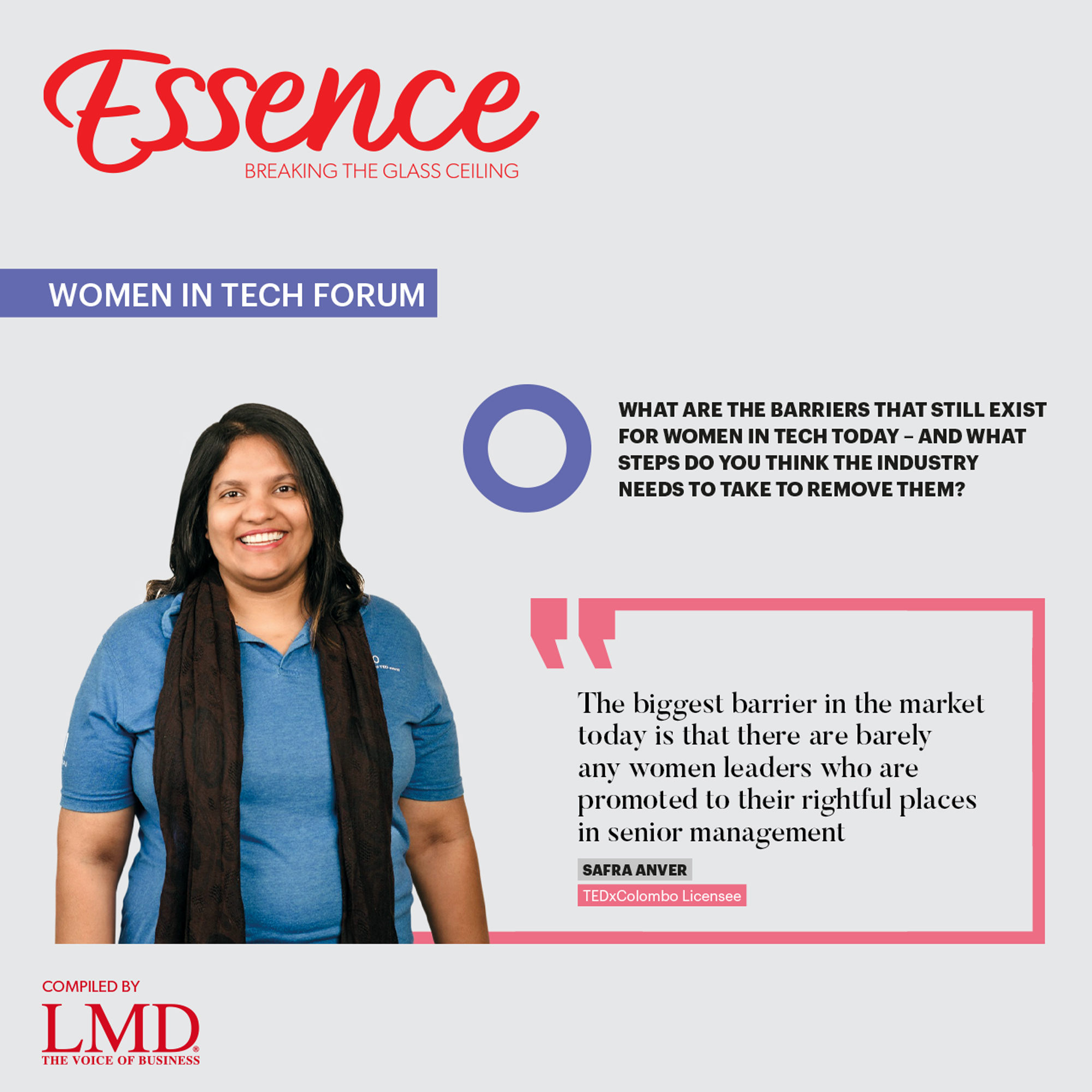ENABLING WOMEN LEADERSHIP
Zahara Ansary assesses the impact of the pandemic on the finance and accountancy professions
 At a time when every business and industry has been impacted, finance is no exception. In most cases however, the wake-up call has resulted in creating changes to decades long work practices, thereby bringing on efficiencies at work – in a matter of months or weeks, in fact.
At a time when every business and industry has been impacted, finance is no exception. In most cases however, the wake-up call has resulted in creating changes to decades long work practices, thereby bringing on efficiencies at work – in a matter of months or weeks, in fact.
The significant shifts in the profession have also called for new skills and competencies, albeit applicable to both genders but in some cases, impacting female folk more.
A changed world inevitably needs updated and relevant skills. For women in business, this also invariably means dealing with many more challenges than they have in the past. Forever known as multitaskers, they now have expanded roles, whether working from home or in the office.
However, it is not all stormy seas as there are silver linings within.
The finance and accounting profession had already been evolving in the past few years due to automation. Data and digitalisation underpin the future of finance.
“Even with regard to the financial [services] industry, it has become clear to the last doubters that data, algorithms and virtual communication lay the indispensable foundation for business models and customer interactions in the 21st century,” the World Economic Forum (WEF) noted in June last year.
Even in Sri Lanka, we’ve seen the use of artificial intelligence (AI), machine learning and robotic process automation in use by most finance teams of reputed organisations, though some have yet to join the bandwagon.
So why is this crucial?
Automation and technology can help get things done faster, and more effectively; and the same can even be used to aid females with their roles both at work and at home! With schools, universities and institutes continuing to conduct online sessions, as and when there are increases in COVID-19 infections, the use of digital assistants can be of great assistance to female leaders.
Shift in skills In addition to being multitaskers and possessing core technical skills such as accounting, and staying updated on standards, women now need to focus on collaboration skills and repurposing their time and efforts, to help their businesses and organisations grow.
Among the key finance skills for these times that would assist any leader is an emphasis on the basics – cash management is important and has been very much so during the crunch created by the pandemic.
Understanding an appropriate analysis backed cash flow forecast is now a dire need along with the cognitive flexibility to understand differing scenarios of cost volatilities arising from – but not only – the availability of foreign exchange.
The ability to forecast in turbulent times, taking into consideration the gamut of risks out there while completely moving away from rolling budgets that finance teams usually work with, is also a technical skill that one needs to brush up.
Chartered Global Management Accountants (CGMAs) are now more tech and business savvy. They can be trusted business advisors no matter what their function is.
Awareness of the environment, social and governance (ESG), and sustainable finance, is also becoming increasingly important and a mainstream requirement.
ENVIRONMENTAL AWARENESS
If you haven’t read about environmental awareness, here’s a great place to start…
https://www.cgma.org/topics/sustainability.html?vngagetrans=emRtBKtm868ADjZPIVNe
Digital literacy Gone are the days when technology was a male-led domain. Significant efforts are being made to increase women’s representation in technology and related industries.
We now have CIMA qualified data scientists who create successful ready to use products using AI and machine learning technologies – i.e. for domain specific use across multiple industries.
Digital skills, literacy and know how are must-haves in today’s business world, especially knowledge of transformative technology.
StoryTelling While working side by side with technology, the ability to use the tools and data at your disposal to make decisions is even more critical. One needs to be able to tell the story in a convincing yet succinct way.
For example, the shift would be from the typical thousands of pages of information, to a set of dashboards that clearly show the picture in a meaningful way. A data analytics course or certification will help you do this best.
Never underestimate the power of effective storytelling. You may uncover the best insights but if your audience doesn’t understand the point, or is blanked out under a mountain of data, it’s moot.
Return to Work With great technology come great opportunities. One of the best lessons the pandemic has taught us is the ability to work remotely and the increasing number of remote jobs on offer.
As we’re all aware, though a good 60 percent of university graduates are females, nearly a third of them do not join the economically active population in Sri Lanka, mostly after marriage or having children. This is the ideal time for this segment of women to return to work and corporates to utilise this talent, albeit following training and refreshing their skills.
It could even be working for organisations like ReMAtics, which is a brilliant example of a company that helps the skilled female workforce to work flexibly while being engaged in a rewarding experience.
 career growth Envision where you’d like to be. According to a Deloitte research study concluded in November 2021, the proportion of women in leadership roles in financial services firms is 24 percent and this is projected to grow to 28 percent by 2030. But this is still below parity.
career growth Envision where you’d like to be. According to a Deloitte research study concluded in November 2021, the proportion of women in leadership roles in financial services firms is 24 percent and this is projected to grow to 28 percent by 2030. But this is still below parity.
In Sri Lanka, the numbers at the top are growing but are unsatisfactory. One of the key areas to consider, if you’re in mid or senior leadership, is to push your organisation to implement gender equity policies to hire, retain and promote women – and improve the visibility of women, regardless of their in-office or at-home work environment.
Leveraging the multiplier effect, whereby one woman in leadership correlates with two or three women in management roles, would also be ideal as a mentor would do wonders for an aspiring professional.
PERSONAL Branding Thought leadership is a useful tool to showcase expertise and boost your prospects and personal branding.
Personal branding helps control how you’re perceived. By presenting yourself through articles, interviews, webinars and presentations, or contributing to industry groups, you will be able to create your brand and market positioning. LinkedIn would be your best friend to take these efforts forward.
Associations and Chambers Be involved and engaged. Be it your professional accountancy body like CIMA, any other industry bodies or chambers – such as the Women’s Chamber of Industry and Commerce (WCIC) and Women in Management (WIM) among others – be involved to make use of networking opportunities and collaboration.
Women in Leadership This is good for business – and for society. Though International Women’s Day is celebrated with activities and events annually, its impact doesn’t necessarily last for the rest of the year.
The reality is that women are underrepresented in leadership, be it at board or management level. This is where CIMA has been able to create and make a difference.
Among our membership are women who’ve reached the pinnacle of success, shattering all ceilings – such as Jayanthi Dharmasena (FCMA, CGMA), who is the first woman director of Hayleys; Kasturi Chellaraja Wilson (FCMA, CGMA), the first female Group CEO of a Sri Lankan conglomerate – Hemas Holdings; and Melanie Kanaka (FCMA, CGMA), CIMA’s first woman Deputy President from outside the UK and Europe, and the third female overall in this hallowed position in CIMA’s 103 year history.
Women in leadership is good for growing sustainable businesses; and that is a story we need to keep emphasising.
CIMA’s initiatives In order to nurture women in business and finance, CIMA in Sri Lanka and globally – through the Association of International Certified Professional Accountants (AICPA and CIMA) – continues to bring initiatives to assist women in reskilling themselves, enabling those who are also away from industry or the profession to gain the CIMA professional qualification through various fast track routes.
The launch of the CGMA Finance Leadership Program (FLP) – a fully remote, digital, self-paced learning programme that enables candidates to complete the CIMA qualification faster – has been a boon to those who left the qualification mid-way previously to upskill and be employable, both locally and globally.
INFORMATION ABOUT CGMA FLP
https://www.cimaglobal.com/Our-locations/SriLanka/Finance-Leadership-Program/
There are also Continuous Development Programmes (CPDs), Conferences such as Women Summit, Engage Training and other trainings, which are utilised by various corporate partners and top employers of CIMA, to enable their women employees to adapt and grow in these challenging times.
questions to ponder
As you reflect on what’s said here, consider these questions to identify whether you’re ready to be a woman finance leader…
Are you aware of how the pandemic and these exceptional times have changed your thinking about developing yourself – and your people?
Do you wish to be a leader who inspires the future generations of Sri Lanka?
What critical competencies will you need to reskill yourself – and ‘get there’?
Zahara Ansary is the Country Manager for CIMA in Sri Lanka





